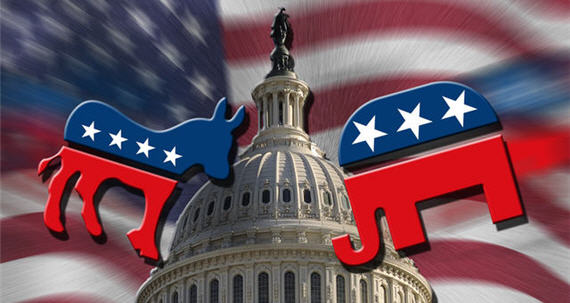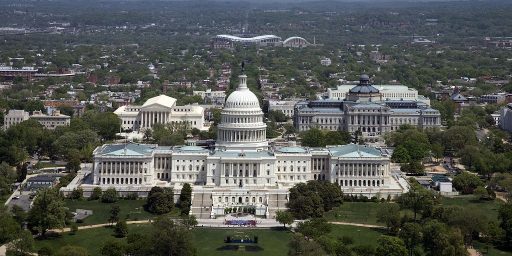Voters Split On ObamaCare Ruling, Oppose Efforts To Repeal The Law
A new pair of polls continues what we’ve seen over the past several days, namely that the American public is rather divided over the Supreme Court’s ruling on the Affordable Care Act, but they also suggest that voters are ready to move on from the health care wars:
CNN’s new poll finds Americans split on whether they approve of the Supreme Court decision, 50-49. Moderates agree with it, 54-45, but independents tilt against it, 47-52.
Support rises — as it does in other polls — when you ask about the bill’s provisions. The largest group of all, 43 percent, supports “most” of the provisions in the bill, and a total of 52 percent support most or all of the bill’s provisions, versus only 47 percent who oppose most or all of them. Fifty-nine percent of moderates support most or all the provisions. And get this: even though independents tilt against the SCOTUS decision, they support the bill’s provisions, 51-48.
Obamacare foes will note that Americans would rather repeal all the bill’s provisions than keep all of them, 51-47; independents agree, 56-42. But remember, polls that only give you a choice between total repeal and keeping all of the the law tend to produce findings that favor the former. If you portray the situation more accurately by presenting a range of options — full repeal, repealing only parts, keeping the bill as is, expanding it — suddenly support for full repeal is far lower, as Gallup found on Friday. This dynamic is reinforced by CNN’s finding that majorities — including among independents — favor most or all the provisions.
Meanwhile, the new Kaiser poll finds that opinion on SCOTUS decision is roughly split, at 47-43.
But it also finds — and this one is key — that 56 percent of Americans, and 51 percent of independents, want the law’s opponents to stop trying to block implementation and move on to other problems. Meanwhile, a big majority of Republicans, 69 percent, want efforts to stop the law to continue. Only 41 percent of independents agree.
That last part is key, I think, because it suggests that the GOP will be miscalculating if it makes the repeal of the PPACA a major part of the fall campaign. It’s an issue that quite obviously rallies the base, but this poll suggests that it’s not one that resonates with voters as a whole, and especially not with Independents. It may be that, for these voters, the ruling from the Supreme Court is seen as some kind of finality in the war that has been fought over this issue since 2009, and they now want to see politicians move on to other issues. It’s not directly polled, but I would suspect that, even today, the economy and jobs remain far more important to voters than the fate of the PPACA.
At the same time, there’ s a third poll out there that makes one wonder just how much the public knows about what the Supreme Court ruled on Thursday. Alexander Burns points to a new Pew Research Center poll that seems to indicate that a lot of them are confused:
The public has long been divided in its opinions about the 2010 health care law. There is now a similar division of opinion over last week’s Supreme Court decision to uphold the law – 40% say they disapprove of the decision, while 36% approve and nearly a quarter (24%) offer no opinion.
Despite extensive public interest in the court’s ruling, just 55% of the public knows that the Supreme Court upheld most of the health care law’s provisions; 45% say either that the court rejected most provisions (15%) or do not know what the court did (30%). Among those aware that the court upheld most of the law, 50% approve of the decision while 42% disapprove.
Given the fact that the decision came down as we were heading into a holiday week, it’s perhaps understandable that some people aren’t fully aware of what happened. However, this may also be a sign that voters aren’t really paying much attention to the issue because they have other, more pressing concerns. In other words, it’s still the economy, stupid.
Update: A new ABC News/Washington Post poll is consistent with what we’ve seen since the weekend.





Yes, and one of the ironies is that we have all those quotes from conservative politicians saying that Obama should not have spent so much time on health care. Except now, oops, they want to make it their elective focus.
Ah, look at this:
Romney Campaign Declaring Cease Fire on Health Care
Some conservative groups are responding to that, asking Romney to drop out of the race, if you can believe it.
Indirectly, Justice Roberts gave Obama some good advice: “Explain this damned thing to the American public, it might save your presidency.”
Well, yes, but in the sense that people would like to keep the goodies without having to pay for them, as always. For example, they dislike the mandate, but experts and politicians on both sides agree that it was a necessary part of the bill to have the more popular community rating and mandatory issue provisions.
If a bill were passed to raise the gas tax and use that to fund a bunch of infrastructure improvements, I’m sure you’d find more support in a poll for “repeal the tax increase, but keep the extra infrastructure structure” than either repealing the bill entirely or keeping it entirely.
That’s not entirely a hypothetical– it explains why the recent highway bill passed with a bipartisan compromise of more transportation spending that the gas tax could pay for, combined with not raising the gas tax but having a pension gimmick to pay for it. The right-wingers didn’t want to raise the gas tax, and sought to decrease the spending. The left-wingers wanted more spending, and sought to increase the gas tax. The compromise was to have the spending without the taxes.
Far from being surprising, this polling result demonstrates why we’ve have the fiscal performance of the last 12 years. Goodies without paying for them are always the moderate bipartisan compromise that wins out in the polls.
Spending without raising taxes more popular in polling than tax-and-spend or cutting spending for real. Shocker.
It’s the attitude of these same swing voters that’s gotten us into our fiscal mess.
@John Thacker:
You’ve quickly summed up one the main problems with today’s GOP.
@David M: Oh, I certainly agree. And the main problem with today’s Democrats is exactly the same. They also want to have more spending without paying for it. Yes, I know that they want to make “other people” pay for it. But if you take seriously their claim of shrinking the deficit by only raising taxes among those making over $250k, you end up with a highest marginal tax rate well above 100%. In reality, their plans also require either spending without paying for it, or raising middle class taxes (as do the GOP plans), but they don’t want to admit it.
I know that the Democrats always claim that the dastardly threats of the GOP forced them into it. But even when it’s only the threats of possibly losing at the polls, and even when they have a 59 or 60 vote edge in the Senate and a House majority and could easily have raised taxes, they don’t.
The GOP, for their part, will offer the same complaints about how, sure, they’d love to actually lower spending, but it’s just too unpopular, darn it.
Both parties are largely correct that they’re forced into this stupidity by the electorate. The moderate middle, which includes people of completely opposite views, includes a lot more swing voters who want more spending but don’t want to have to pay for it than people who think the opposite. The hardcore believers on each side are actually far more consistent, but to win, each party has to attract the swing voters who want something for nothing.
We have perfectly the government we deserve. And it’s not because of extremists on either side. We have the government of the moderate swing voters. That’s why the GWB Administration policies are so close to those of Obama.
@John Thacker:
Exactly right.